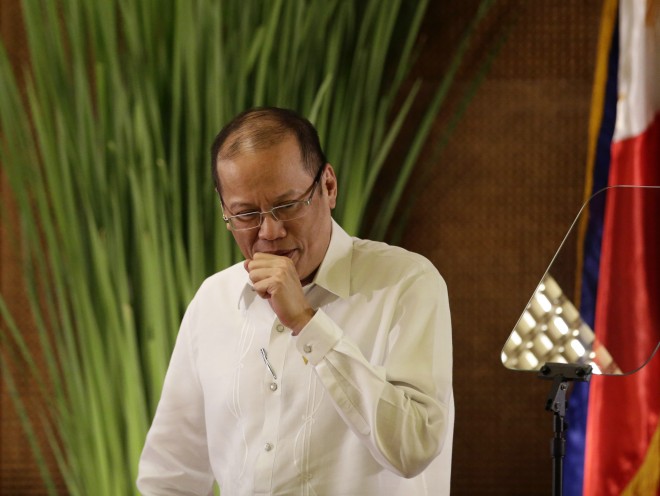President must quit playing lawyer; the country needs a statesman


President Aquino walks to interact with his guests following his address to the nation in a live broadcast from the Presidential Palace in Manila on July 14, 2014. The President defended the government’s position in the now controversial Disbursement Acceleration Program (DAP), which was ruled as unconstitutional by the Supreme Court. AP
We must rise above the din of partisan maneuvering and see that what rages today is not just a contest among political titans but a clash between two competing bases of legitimacy.
The first is the law, which antigraft crusaders deploy against both the Priority Development Assistance Fund (PDAF) enjoyed by legislators and the Disbursement Acceleration Program (DAP) enjoyed by the President.
The second is common sense and the public good, which President Aquino has invoked to explain what he has done to jump-start the economy and deliver social projects. He would go beyond legalism and return everyone to the big picture.
It’s not just that these claims clash with one another. Worse, the protagonists take turns switching from one frame to another whenever it suits their cause. It’s as if we’re watching gladiators fight, but the ground beneath the coliseum keeps shifting.
What a difference a year can make.
Article continues after this advertisementIn July 2013 when the Inquirer broke its investigative report on the pork barrel scam, who would have imagined that eventually all three branches of government would be accusing one another of dipping their hand in the public till?
Article continues after this advertisementJust like the Watergate scandal that began with a bungled burglary, the pork barrel exposé began as the abduction and rescue of, as we would later discover, the insider-turned-whistle-blower.
No, this wasn’t the handiwork of constitutional checks-and-balances operating sua sponte (on their own) like “a machine that would go of itself.”
Instead, it took a free and courageous press to expose Janet Lim-Napoles’ racket, which in turn provoked a Million People March to abolish pork barrel, and today the three senators of the realm who profited most from Napoles’ operation are under arrest.
While the press can try to bridge this gap between the two conversations, the legal and the moral, it abides by the old wisdom that the ultimate check against the abuse of power lies not in institutions but in ourselves. “Eternal vigilance is the price of liberty; power is ever stealing from the many to the few.”
The turning of the tide
Remember that when the Supreme Court struck down the PDAF, the bad guys were the legislators, and the biggest winner was the President.
The high court said that Congress should limit itself to enacting the annual budget, the General Appropriations Act (GAA), and should leave to the President the discretion on how to carry it out.
The court frowned upon any “postenactment” powers by legislators, e.g., to choose which bridge or school to build, and which builder will get the contract.
But that precisely is the patronage power, to reward friends and punish enemies.
In effect, the high court reposed the largess solely in the hands of the President … and people didn’t seem to mind.
Fast forward to the DAP, and the conversation suddenly changed.
What troubled the public was the broad discretion that the President had exercised outside the GAA.

The turning of the tide was unexpected.
To this day, President Aquino has not been accused of having pocketed any public money.
His reputation for honesty stands. He insists that all the funds had been directed to projects that benefit the people.
The accusation is merely that he has taken constitutional shortcuts. Yet today he faces three impeachment cases, tarred and feathered no differently from those who actually thieved and stole with neither guilt nor shame.
His critics argue that the ends do not justify the means, and insist that the public good requires good governance.
The power of legalese
The strongest challenge against President Aquino’s insistence of what he calls “the simple, nonlegalistic mind” is that his daang matuwid—the right path—has itself relied on the power of legalism.
Sure, it was substantive justice that triggered the public’s outrage over the PDAF. Sure, it was that outrage that pushed the Supreme Court to declare the PDAF unconstitutional, because the court, left to itself earlier, had thrice validated the PDAF as God’s gift to budgetary flexibility, even praising it as the protector of minority congressmen against the party in power.
But the final blow against the PDAF was entirely legal, namely, that the legislators had encroached into post-GAA implementation, a power that belongs to the President.
That has set the legal tone of the ensuing debate on the DAP. And now the coup de grace against the PDAF becomes the opening salvo against the DAP.
2 boundaries
To summarize briefly, there are two relevant, bright-line boundaries laid down by the Constitution.
One, “no money shall be paid out of the Treasury except in pursuance of an appropriation made by law.”
Public money can be spent only according to the GAA enacted by Congress.
Two, “no law shall be passed authorizing any transfer of appropriations.”
Once Congress approves the GAA, no one may tinker with it—but the President and the heads of the other departments may “augment any item in [their budgets] from savings in other items of their respective appropriations.”
The Supreme Court said the President’s definition of “savings” was too broad; he deemed all unspent funds “savings,” which he then “realigned” for other projects not covered in the GAA.
Next, the “augmentation” of funds may be made only within each branch of government, but the President had made “cross-border” transfers outside the executive branch, e.g., to the Commission on Audit.
Et tu, Meilou?
The legalistic approach has its limits. That was President Aquino’s point when he turned the tables on the Supreme Court for itself attempting “cross-border” transfers, and balked only after the DAP had been exposed.
These involved P1.865 billion and P100 billion, respectively, which crossed the border, so to speak, in both directions, from the executive to the Supreme Court, and vice-versa. What’s sauce for the goose is sauce for the gander. “Why behold the mote in thy brother’s eye, but consider not the beam in thine own?”
The legalistic approach also feigns indifference to the real world consequences of the court’s obiter dicta (or side comments, distinguished from the “ratio” or the core ruling).
The court, having struck down the DAP, held that as far as possible the DAP-funded projects should not be reversed or undone, citing a doctrine called “operative fact.”
But when the court added that the doctrine “cannot apply to the authors … of the DAP, unless there are concrete findings of good faith,” the learned magistrates certainly knew that they were laying the groundwork for future prosecution, and not merely talking off-the-cuff. Thus the President’s query: Whatever happened to the presumption of innocence?
But its true limit is its indifference to public opinion. When the court rejects the taxman’s request to see their statements of assets, liabilities and net worth (SALN), saying they had shown them to others anyway in the past, they were making a legal point (“You need our permission”) but missing the political point (“If you don’t have anything to hide … ”).
Finally, the court has its own discretionary fund, the P1.775-billion Judiciary Development Fund. A Marcos-era law gave the Chief Justice the “sole discretion” over how it is spent, save for one motherhood guideline, “for the benefit of the members and personnel of the judiciary to help ensure and guarantee the independence of the judiciary.”
The Commission on Audit questioned the P3.19 billion in savings that the Supreme Court prematurely declared in 2012, in much the same way for which it had chastised the President, and has called upon the court to adopt more specific spending rules and abandon its unfettered discretion.
‘He who rides the tiger …’
In this context, the law is an instrument that can enslave its maker. As the ancients have said, “He who rides the tiger cannot dismount.”
Locally we tend to read the Constitution as if it were a user’s manual or a technical code. But John Marshall, widely considered America’s greatest chief justice, warns: “We must never forget that it is a constitution we are expounding.” It is “intended to endure for ages to come, and consequently to be adapted to the various crises of human affairs.” That is why legal scholars have called for a return to “popular constitutionalism” lest we, Harvard law professor Richard Parker warns, “inflat[e] constitutional law, its grandiose puffing as law imagined to be ’higher’ [and feed] on disdain for the political energy of ordinary people.”
President Aquino is getting mixed signals from the Filipino people. He waved the banner of a moral crusade aimed at lofty goals, and, many times in the past, they cheered him on even as he defied the Supreme Court and its traditions.
But today the Filipinos seem to want a rule-bound daang matuwid, that is, confined by the rules President Aquino has used against its enemies.
The President must by now understand why the moral high road is the road less traveled, but he must refuse to play lawyer when what the country needs is a statesman.
RELATED STORIES
Palace: We have more explaining to do
You ain’t seen nothing yet: Aquino on SC case again
Aquino turns tables on SC, says it implemented DAP-like measure